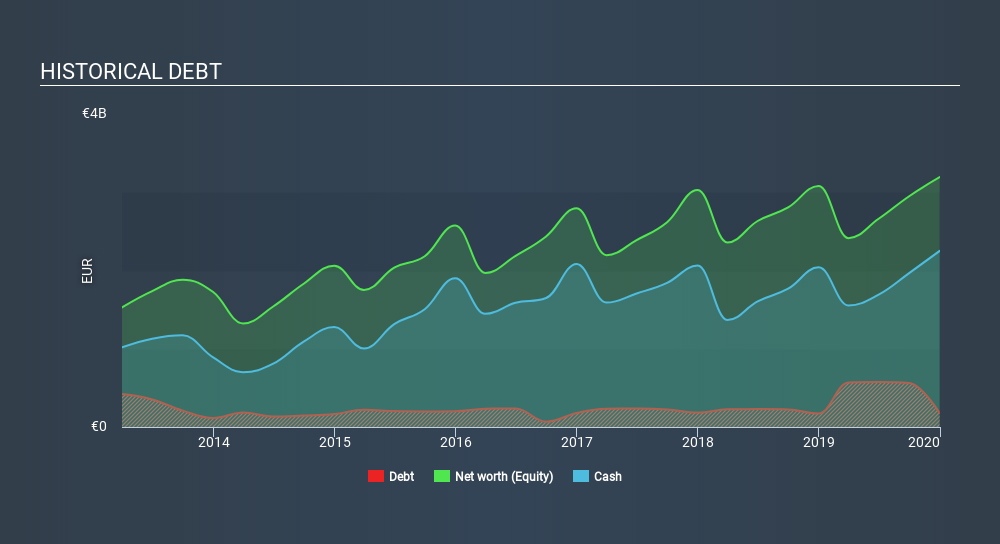
Legendary fund manager Li Lu (who Charlie Munger backed) once said, 'The biggest investment risk is not the volatility of prices, but whether you will suffer a permanent loss of capital. It's only natural to consider a company's balance sheet when you examine how risky it is, since debt is often involved when a business collapses. We can see that KONE Oyj (HEL:KNEBV) does use debt in its business. But the more important question is: how much risk is that debt creating?
When Is Debt A Problem?
Generally speaking, debt only becomes a real problem when a company can't easily pay it off, either by raising capital or with its own cash flow. Part and parcel of capitalism is the process of 'creative destruction' where failed businesses are mercilessly liquidated by their bankers. However, a more common (but still painful) scenario is that it has to raise new equity capital at a low price, thus permanently diluting shareholders. By replacing dilution, though, debt can be an extremely good tool for businesses that need capital to invest in growth at high rates of return. When we examine debt levels, we first consider both cash and debt levels, together.
See our latest analysis for KONE Oyj
What Is KONE Oyj's Net Debt?
The chart below, which you can click on for greater detail, shows that KONE Oyj had €178.0m in debt in December 2019; about the same as the year before. However, its balance sheet shows it holds €2.25b in cash, so it actually has €2.07b net cash.

How Strong Is KONE Oyj's Balance Sheet?
According to the last reported balance sheet, KONE Oyj had liabilities of €4.63b due within 12 months, and liabilities of €792.1m due beyond 12 months. On the other hand, it had cash of €2.25b and €2.65b worth of receivables due within a year. So it has liabilities totalling €516.0m more than its cash and near-term receivables, combined.
This state of affairs indicates that KONE Oyj's balance sheet looks quite solid, as its total liabilities are just about equal to its liquid assets. So while it's hard to imagine that the €26.4b company is struggling for cash, we still think it's worth monitoring its balance sheet. Despite its noteworthy liabilities, KONE Oyj boasts net cash, so it's fair to say it does not have a heavy debt load!
Also good is that KONE Oyj grew its EBIT at 11% over the last year, further increasing its ability to manage debt. When analysing debt levels, the balance sheet is the obvious place to start. But it is future earnings, more than anything, that will determine KONE Oyj's ability to maintain a healthy balance sheet going forward. So if you want to see what the professionals think, you might find this free report on analyst profit forecasts to be interesting.
Finally, while the tax-man may adore accounting profits, lenders only accept cold hard cash. While KONE Oyj has net cash on its balance sheet, it's still worth taking a look at its ability to convert earnings before interest and tax (EBIT) to free cash flow, to help us understand how quickly it is building (or eroding) that cash balance. During the last three years, KONE Oyj generated free cash flow amounting to a very robust 81% of its EBIT, more than we'd expect. That positions it well to pay down debt if desirable to do so.
Summing up
We could understand if investors are concerned about KONE Oyj's liabilities, but we can be reassured by the fact it has has net cash of €2.07b. The cherry on top was that in converted 81% of that EBIT to free cash flow, bringing in €1.2b. So is KONE Oyj's debt a risk? It doesn't seem so to us. The balance sheet is clearly the area to focus on when you are analysing debt. However, not all investment risk resides within the balance sheet - far from it. Be aware that KONE Oyj is showing 1 warning sign in our investment analysis , you should know about...
If you're interested in investing in businesses that can grow profits without the burden of debt, then check out this free list of growing businesses that have net cash on the balance sheet.
If you spot an error that warrants correction, please contact the editor at editorial-team@simplywallst.com. This article by Simply Wall St is general in nature. It does not constitute a recommendation to buy or sell any stock, and does not take account of your objectives, or your financial situation. Simply Wall St has no position in the stocks mentioned.
We aim to bring you long-term focused research analysis driven by fundamental data. Note that our analysis may not factor in the latest price-sensitive company announcements or qualitative material. Thank you for reading.
About HLSE:KNEBV
Proven track record with adequate balance sheet and pays a dividend.
Similar Companies
Market Insights
Community Narratives



